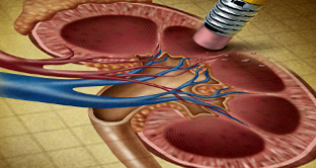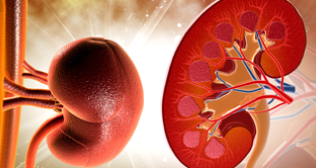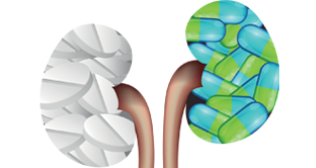
Alport Syndrome: Causes, Symptoms, and Diagnosis
Our bodies are built upon an intricate framework of proteins. One of the most important is collagen, a substance that provides strength and structure to everything from our skin to our internal organs. But what happens when the genetic blueprint for a crucial type of collagen contains an error? The result can be a rare, inherited condition that quietly and progressively affects some of our most vital systems. This condition is known as Alport syndrome.
For families affected by Alport disease, the journey often begins with a subtle sign, like a finding on a routine urine test, that hints at a more complex underlying issue. Receiving a diagnosis can be overwhelming, filled with unfamiliar medical terms and uncertainty about the future. Understanding this condition is the first, most powerful step toward managing it effectively. This is a guide to demystifying Alport syndrome, explaining its genetic roots, the symptoms it causes, and the path to a clear diagnosis.
What Is Alport Syndrome?
Alport syndrome, sometimes called hereditary nephritis, is a genetic disorder characterized by a progressive loss of kidney function, hearing loss, and abnormalities of the eyes. At its core, the condition is caused by mutations in the genes that provide instructions for making Type IV collagen.
Think of Type IV collagen as a specialized, high-performance filter material and structural support system. It is a critical component of the basement membranes, which are thin, sheet-like structures that separate and support cells in many parts of the body. In Alport syndrome, this collagen is faulty. The defective protein cannot form the strong, resilient network it is supposed to. Over time, this weak framework begins to break down in the places where it is most important:
In the Kidneys: It affects the glomeruli, the tiny filtering units that clean the blood.
In the Inner Ears: It impacts the cochlea, which is responsible for translating sound vibrations into nerve signals.
In the Eyes: It affects the lens and the retina.
The gradual breakdown of these structures is what leads to the three classic features of the disease.
The Genetic Roots of Alport Syndrome Inheritance
Understanding that Alport syndrome is an inherited condition is key to understanding its diagnosis and its impact on families. The pattern of inheritance not only determines how the disease is passed down but also often influences the severity of the symptoms.
The most common form, accounting for about 80% of all cases, follows an X-linked inheritance pattern. The gene responsible for the mutation is located on the X chromosome, one of the two chromosomes that determine a person's sex.
Impact on Males (XY): Males have only one X chromosome. If they inherit a faulty gene on that chromosome, there is no second, healthy X chromosome to compensate. As a result, males with X-linked Alport typically experience the full and most severe symptoms of the disease.
Impact on Females (XX): Females have two X chromosomes. If one carries the mutated gene, the other, normal X chromosome can often partially compensate. For this reason, females are often considered "carriers." Some may have no symptoms at all, while others might have mild symptoms like blood in the urine. However, it is now known that many female carriers are at risk for developing kidney problems later in life.
While less common, there are other patterns of Alport syndrome inheritance. Autosomal recessive and autosomal dominant forms also exist, caused by mutations on other chromosomes, and they affect males and females more equally. Genetic testing is crucial for identifying the specific pattern within a family.
Recognizing the Alport Syndrome Symptoms
The Alport syndrome symptoms do not appear all at once. They develop gradually, often beginning in early childhood and progressing over years. The signs are directly related to the breakdown of the basement membranes in the kidneys, ears, and eyes.
Progressive Kidney Disease
This is the most serious manifestation of the condition, often referred to as Alport kidney disease. The faulty filters in the glomeruli become scarred and lose their ability to function.
Hematuria (Blood in the Urine): This is usually the very first sign, often detected in young boys. At first, it is typically microscopic, meaning the blood is only visible under a microscope during a urinalysis. Occasionally, it can be macroscopic, making the urine appear pink, red, or cola-colored, especially during an illness like a cold.
Proteinuria (Protein in the Urine): As the kidney filters become more damaged, they start to leak protein from the blood into the urine. This is a sign of worsening kidney disease. High levels of proteinuria can cause swelling (edema) in the legs, ankles, and around the eyes.
Progressive Kidney Failure: Over time, the damage leads to a steady decline in kidney function. This progression eventually leads to end-stage renal disease (ESRD), a point where the kidneys can no longer support the body's needs.
Hearing Loss
The hearing loss associated with Alport syndrome is sensorineural, meaning it is caused by damage to the inner ear. It is typically not present at birth. It usually develops in late childhood or early adolescence, often appearing before the onset of kidney failure. The hearing loss affects both ears and primarily impacts the ability to hear high-frequency sounds, making it difficult to understand speech in noisy environments.
Eye Abnormalities
Several eye issues are characteristic of Alport disease, though they may not always affect vision.
Anterior Lenticonus: This is a spontaneous, cone-shaped bulging of the front of the eye's lens. It is a highly specific sign of Alport syndrome and can cause a slow blurring of vision that may require glasses or cataract surgery.
Dot-and-Fleck Retinopathy: The presence of abnormal white or yellowish flecks on the retina. These usually do not cause vision problems but are a valuable clue for diagnosis.
Corneal Erosions: Recurrent scratches or abrasions on the surface of the cornea that can cause eye pain, light sensitivity, and blurry vision.
The Path to an Accurate Diagnosis
Diagnosing Alport syndrome is like solving a puzzle. It involves piecing together evidence from a person's family history, a physical exam, and several specialized tests.
Urinalysis: The first step is often a simple urine test to confirm the presence of persistent microscopic hematuria.
Kidney Biopsy: This used to be the gold standard for diagnosis. A small sample of kidney tissue is removed and examined with a powerful electron microscope. In Alport syndrome, the pathologist can see a characteristic splitting and laminating of the glomerular basement membrane, which is the faulty filter.
Hearing and Eye Exams: A formal hearing test (audiogram) is needed to detect the specific type of hearing loss. A detailed eye exam by an ophthalmologist is essential to look for signs like anterior lenticonus.
Genetic Testing: Today, genetic testing is the most definitive way to diagnose Alport. A blood test can identify the specific mutation in one of the Type IV collagen genes. This not only confirms the diagnosis but also identifies the specific inheritance pattern, which is crucial for family counseling.
A Note on Alport Syndrome Treatment
Currently, there is no cure for Alport syndrome. The goals of Alport syndrome treatment are to slow the progression of kidney disease, manage symptoms, and maintain the best possible quality of life. The cornerstone of medical therapy is the use of blood pressure medications called ACE inhibitors or ARBs. These drugs help protect the kidneys by lowering the pressure inside the filters and reducing the amount of protein that leaks into the urine. Other supportive care includes hearing aids for hearing loss and standard treatments for eye problems. When Alport kidney disease progresses to kidney failure, treatment involves dialysis or a kidney transplant.
A Proactive Partnership in Your Health
Alport syndrome is a complex, lifelong condition that requires care from a dedicated team of specialists. Early and accurate diagnosis is the most important factor in developing a proactive management plan that can help preserve organ function and delay complications.
For individuals with suggestive symptoms or a family history of kidney disease and hearing loss, seeking a thorough medical evaluation is vital. Partnering with nephrologists, audiologists, and ophthalmologists allows you to navigate the journey with the best possible support and expertise.
Frequently Asked Questions
Q1. Is Alport syndrome fatal?
Ans. The condition itself is not fatal, but the resulting end-stage renal disease can be life-threatening without treatment. With modern Alport syndrome treatment, including blood pressure control, dialysis, and successful kidney transplantation, individuals can live long and productive lives.
Q2. If I have Alport syndrome, will my children get it?
Ans. This depends entirely on the Alport syndrome inheritance pattern in your family. For the common X-linked type, an affected man will pass the gene to all of his daughters (making them carriers) but none of his sons. A female carrier has a 50% chance of passing the gene to each of her children, regardless of their sex.
Q3. Can Alport syndrome be diagnosed before a child is born?
Ans. Yes. If the specific gene mutation has been identified in a family through genetic testing, prenatal diagnosis through procedures like amniocentesis or chorionic villus sampling is possible. This is a personal decision that can be discussed with a genetic counselor.
Q4. Why is early diagnosis so important for this disease?
Ans. Early diagnosis allows for the early initiation of protective kidney therapies, primarily ACE inhibitors. Studies have shown that starting these medications when there is only minimal protein in the urine can significantly delay the progression to kidney failure, adding years of function to a person's native kidneys.



















